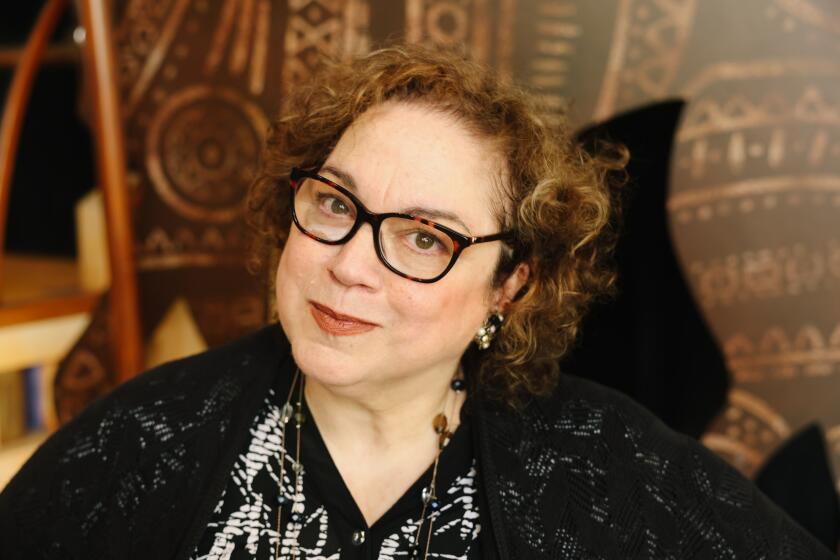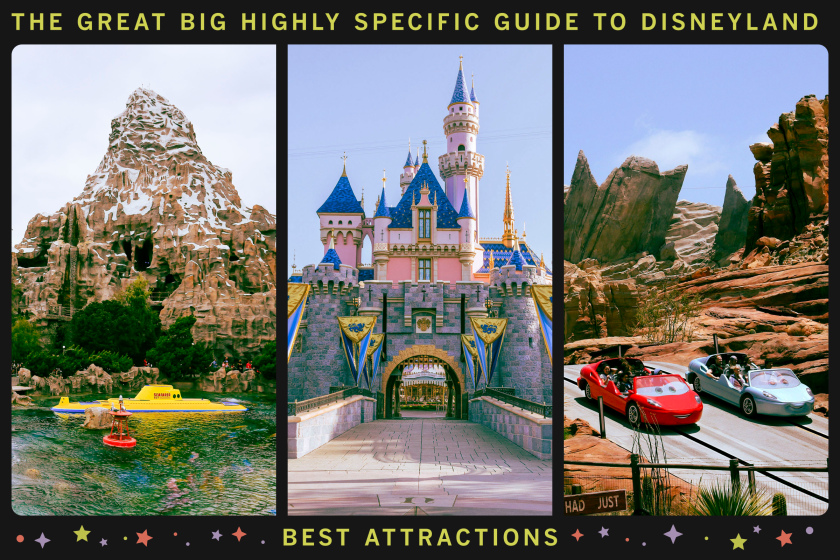Disneyland’s holiday fest dazzles with Latin traditions and a candlelit ‘Silent Night’

- Share via
- The Latin American tradition of Las Posadas played a major influence in one of Disney California Adventure’s new holiday offerings.
- Festival of Holidays places the emphasis on diversity, reflecting resort-wide initiatives that in recent years have reworked rides and removed outdated stereotypes.
One of the Disneyland Resort’s new holiday offerings is a show featuring the young guitar-slinging character of Miguel from “Coco.” But it’s ultimately rooted in a culture and history that long predates the 2017 film.
Show director Tobi Longo pulled from her childhood, her family roots and a cultural heritage in working with her peers to bring the mariachi-focused performance to life. In turn, its primary influence was not the Disney/Pixar film, but Las Posadas. The latter — think a festive procession that travels among the community — are traditionally staged in Mexico between Dec. 16 and 24. In their purest form, Las Posadas depict the biblical story of Joseph and Mary and the search for shelter at the time of Jesus’ birth.
The Disney performance deviates from the religious overtunes. But some of the key touchstones — a mix of music and stories, a centering of children with candles — are present. The early evening weekday show, officially dubbed “A Musical Christmas with Mariachi Alegría de Disneyland & Miguel,” is part of this year’s expanded programming for Disney California Adventure’s Festival of Holidays, now a nearly decade-long tradition that focuses its events on the cultures that Disney films represent rather than the films themselves.

In that sense, Festival of Holidays taps into the original mission of Disneyland, that is, presenting an aspirational view of society that looks as much as the world beyond its gates as it does the fantasies held inside them.
Longo, asked about the inspiration behind the show, spoke of her upbringing.
“My grandfather was going to become a priest at the San Gabriel Mission, and he met my grandma and didn’t go that route,” Longo says. “But my family participated in Las Posadas, and in San Gabriel there was a blue line painted on the ground and everyone would follow it, and it was a big tradition for the Mexican Catholic community. I always dressed up as an angel and had a little candle.
“I remember beautiful lanterns and candles and people processing and depicting different characters from the Christmas story,” Longo continues. “So when they talked about doing a sing-along and a processional, I thought, ‘Wouldn’t it be beautiful if we took inspiration from that?’”
Susana Tubert was trained in New York theater but traded Manhattan for Main Street, U.S.A. We talk to Tubert about what drew her to theme parks, and how she’s making them a more welcoming place.
Dancers holding glistening, star-like lanterns lead a musical stroll to the main hub of Disney California Adventure. There, a narrator and singer welcomes and regales guests with tales of how different Latin countries present stories of Santa Claus, or, say, the joy of unwrapping a tamale.
Popular carols — “Santa Claus Is Comin’ to Town,” “Jingle Bells” — are presented bilingually, and while the performance is building to an appearance from Miguel, the climax instead is serene, a candlelit rendition of “Silent Night,” with audience participation. What a moment ago was festive theme park fare becomes something more reflective, all while slightly nodding to the holiday’s more spiritual underpinnings.
“Bringing children up and giving them a candle — I was thinking if that would be controllable?” Longo says. “But the kids get into it and are almost hypnotized by the candle. It turned out to be very sweet, but it’s fun and lively and kind of teaches people a little bit about the Mexican culture and their traditions around Christmastime.”
Such an approach has become a mission of Festival of Holidays.

Disney, says Susana Tubert, creative director of the resort’s live entertainment, has significantly increased the amount of acts it features for the event, which runs through Jan. 6. Musical groups touch on jazz, klezmer, reggae, polka, gospel and more, as the festivities strive to reflect Hanukkah, Kwanzaa and other cultural traditions, this year delves deeper into Southern California’s Filipino and Aztec communities.
It’s a doubling down on diverse and inclusive programming, making Festival of Holidays feel timely, lively and even risk-taking, especially when Disneyland could simply lean on its popular films and fairy tales and avoid the sometimes politicized scrutiny that can come with multicultural programming.
It’s reflective of an approach that has been happening resort-wide. The Walt Disney Co. in recent years has been taking a broad view of its theme parks, looking at places to increase diversity or remove outdated stereotypes. See, for instance, the recent change from Splash Mountain to Tiana’s Bayou Adventure, or tweaks to such classics as the Jungle Cruise to bring the attraction up to modern sensibilities. Coming soon: An update to Disneyland’s Peter Pan’s Flight to remove caricatures of Native Americans.
Disneyland has formally rid itself of Splash Mountain, an attraction that came to be seen as problematic. In its place is a ride that serves as a celebration
“Representation — I think it’s so important,” says Disneyland’s Paul David Bryant, who helps orchestrate Festival of Holidays, focusing heavily on its musical performances.
“And I think that’s exactly what it is we here at the Disneyland Resort are going for,” he continues. “We want to make sure when I, or you or Tobi walks into the park, hopefully we can see someone who looks like us. We are a small world. It makes me feel good when I walk out there and see all these different cultures. When I walk out and see a Kwanzaa group singing R&B that sounds like gospel and is talking about a Disney tune, it takes me on a journey.”
A journey, adds Bryant, about expanding and opening guests’ views of the world. “You get to walk in, and walk out knowing more than you walked in knowing,” he says.
This year for Festival of Holidays, there are three signature shows. Joining the mariachi performance is a new weekday afternoon tale that uses the songs of “Encanto,” only reframing them into one about the frenzied festivities of getting ready for Christmas. It does so while alluding to the film’s Colombian influences.
The two new entertainment offerings join the long-running “¡Viva Navidad!” street parade featuring the Donald Duck-led Three Caballeros. “¡Viva Navidad!” runs on weekends and serves as a folksy event that from beginning to end is a boisterous celebration of Latin art and music, complete with folklórico dancers and mariachis as well as 12-foot-tall mojiganga puppets, that is, large-scale, papier-mâché sculptures.

“Mirabel’s Gifts of the Season” builds up to a large Cumbia finale, with an actor playing “Encanto” protagonist Mirabel trying to teach the audience some dance moves. Throughout, the show humorously captures the hectic nature of decorating and cooking for a Christmas gathering, with the characters sometimes having to make the most out of a little, such as a hastily constructed Christmas tree.
While using a number of songs from the film, the performance isn’t a retelling of it. The show even attempts to re-center the tunes, such as using “All of You” as a borderline ballad for lighting holiday candles.
“Colombia is one of the founding homes of magical realism of Latin America,” Tubert says. “So even the fact that Mirabel crafts this little tree out of sticks and sees it as her Christmas tree is part of that poetry of the everydayness that makes magical realism what it is. We go there. We take ourselves into Colombia and say, ‘What makes this authentic?’ Our dialect coach is giving us perfect accents for Colombia.”
Ranking the rides and attractions at Disneyland and California Adventure from best to worst is hard — but not impossible. Here is the ultimate Disneyland ride ranking.
“Mirabel’s Gifts of the Season” show director Linda Love Simmons says Tubert challenges the team to think beyond just creating a performance that serves as references to the film, even while acknowledging audiences would probably be happy to simply sing along to the songs that they know. Notes Tubert: “It would be the low-hanging fruit to do a sing-along, but that’s already on Disney+.”
“Early on, it was, ‘Let’s do a sing-along,” confesses Simmons. “Susana and I go, ‘We can do better.’
“Susana always says to me, ‘You’re a better storyteller than that.’ So it causes me to dig deep down. ... We did a lot of digging and a lot of crafting. But the most important thing is we wanted to create a feeling — when people watch it, that they relate to the characters and feel something. That’s what we get to do intrinsically in musical theater. Normally everything in a theme park is like, ‘Fast!’ But three-quarters of the way through, we bring it all the way down and sing ‘All of You’ and pass a candle.”
The Festival of Holidays lasts just a few weeks, but it also is making an impact on Disneyland year-round. Tubert, for instance, says that the mariachi band that leads the “Coco” show — Mariachi Alegría de Disneyland — will be sticking around past the holiday season. Expect them to become part of the resort’s musical offerings, she teases.
“This is part of the tapestry of diversity that Disneyland represents,” Tubert says. “This is who we are.”
More to Read
Sign up for The Wild
We’ll help you find the best places to hike, bike and run, as well as the perfect silent spots for meditation and yoga.
You may occasionally receive promotional content from the Los Angeles Times.










